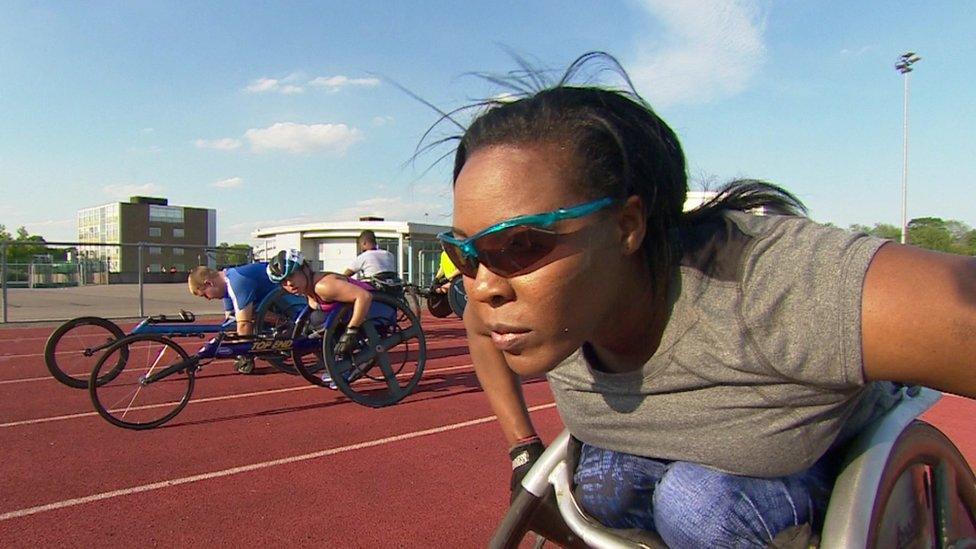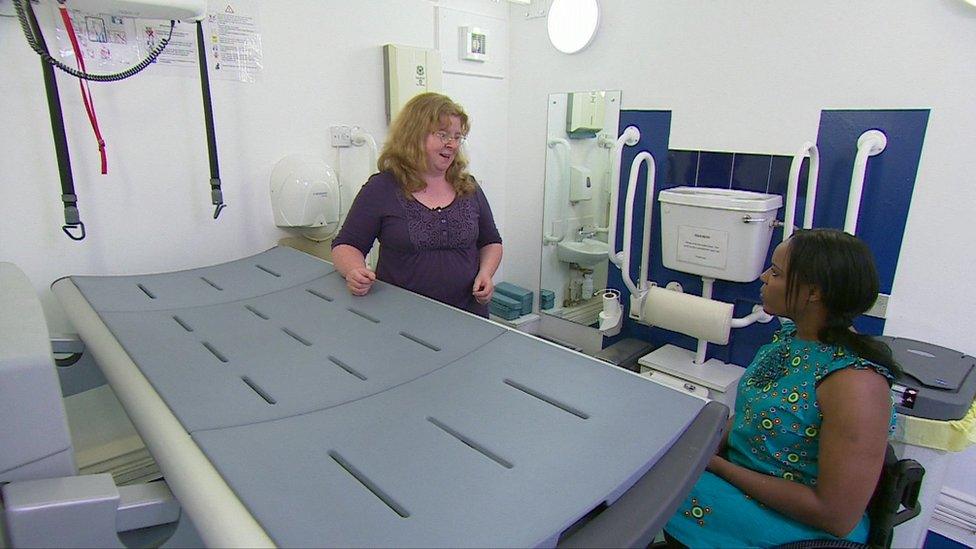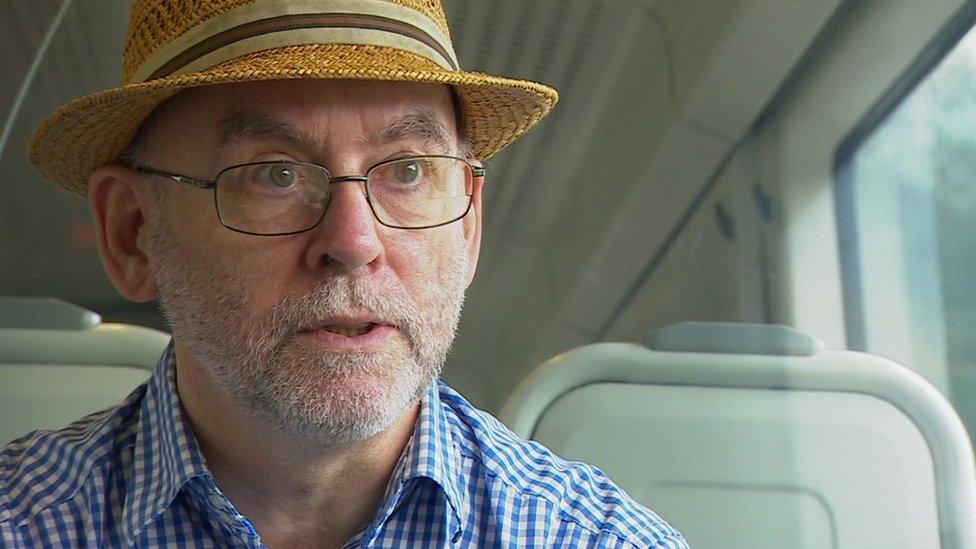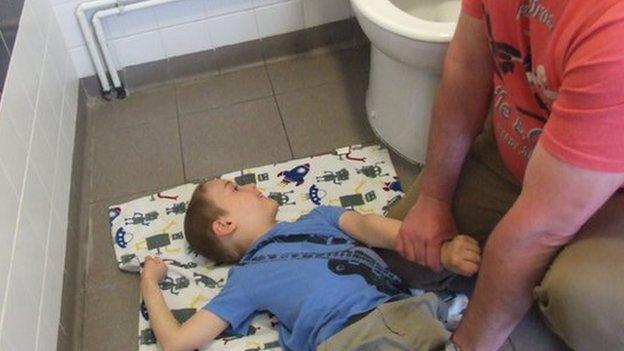'A lack of toilets led me to choose surgery'
- Published
'I chose surgery due to a lack of toilets'
Paralympian Anne Wafula-Strike had to wet herself on a train journey, last year, because the disabled toilet was out of order. Now, she hears from others facing similar problems.
Marni Smyth has spinal muscular atrophy, and has used a power chair since she was three.
She needs a hoist to get on to a toilet, and says finding disabled loos that could accommodate her needs became a daily struggle.
"When I first went to university, I would avoid drinking as much as I could, because [otherwise] I needed to go home and leave a night out early," she tells Anne Wafula-Strike, in the Paralympian's report for the BBC's Victoria Derbyshire programme.
"I'd need a hoist and plinth to get changed on, and they just weren't [available]."
Two years ago, she took the step of undergoing surgery for which she had no medical need.
She had a suprapubic catheter fitted, so she does not have to get out of her chair to go to the toilet.
She says she knows others who have also had the operation, and it has "completely changed my life".

Paralympian Anne Wafula-Strike says having to wet herself on a train was a "humiliating" experience
"I'm so much healthier in general. I used to dehydrate myself. I wasn't drinking all day to avoid having to use the toilet," she says.
The operation, however, can cause infections and complications.
Marni says she "wouldn't change [the catheter] for the world", but still questions why it got to a stage at which she felt such an operation was necessary.
"I kind of wish I didn't have to have it in the first place, if the facilities were there," she says.
'Crawl along the floor'
A 2014 government audit suggested as many as 40% of restaurants and a third of department stores still did not have appropriate toilets for people with disabilities.
This is despite businesses having a legal duty, under the Equalities Act, to make reasonable adjustments so their loos are accessible.
Anne Wafula-Strike doesn't have to look far to find other athletes that have experienced issues over toilet accessibility.
"It happens day in, day out. What's even worse is that some disabled toilets aren't even maintained," Emma Alexander says.
Gary Donald says he once went on a camping trip, only to discover the disabled toilet's ceiling had caved in.
"I just got off my chair, crawled along the floor and climbed up on to the able-bodied toilet. I'm often doing that," he says.

Lorna Fillingham shows Anne a Changing Places toilet
The lack of suitable facilities can also affect parents and carers, some of whom have had to change their loved ones on a toilet floor.
Lorna Fillingham - whose seven-year-old daughter Emily-May has severe disabilities - says: "There are people out there changing people on toilet floors all day, every day - in towns and cities across the UK.
"There are people with very low immunities at risk of catching infections on toilet floors.
"There are people with feeding tubes, tracheostomies, all sorts of things you do not want to get dirty, which could actually kill somebody if they got an infection into it."
Lorna believes the answer lies with Changing Places toilets, which are designed for people with severe disabilities.
They are more spacious and contain specialist equipment, such as an adult changing bench and a hoist to help users out of their wheelchairs.

Emily-May requires an adult changing facility
An estimated quarter of a million people in the UK require such facilities, but there are currently only about a thousand in place for public use.
A recent government committee recommended these toilets be made compulsory in large buildings that serve the public, but no legislation has been put in place to make that happen.
A spokesman for the Department for Communities and Local Government said "working with the disability sector, we're helping to make sure facilities improve for disabled people.
"This includes reviewing building regulations so new buildings are more accessible. We've also recently funded a website to help people find the nearest suitable changing facilities."
Anne Wafula-Strike describes the time she wet herself on a train as "one of the most humiliating experiences of my life".
She had been on a three-hour CrossCountry service from Nuneaton to London Stansted in December 2016 when she discovered the disabled toilet was out of action, with no prior warning.
The government's rail minister later assured her he was committed to ensuring no passenger went through the same ordeal. But it has happened since.
Chris Stapleton was on a Virgin Trains journey from London to Birmingham when he had to wet himself, after he found the disabled toilet broken.

He had booked his ticket six weeks in advance.
"I was angry with the train company's negligence, knowing that there was a wheelchair user needing that toilet potentially on that train," he says.
"There should have been a toilet ready and in working order."
Virgin Trains has since apologised to Chris, and says it has introduced measures to prevent such an incident happening again.
CrossCountry has apologised to Anne.
Action plan
The Paralympian decided to return to the Rail Minister, Paul Maynard, to hear why Chris's experience had been allowed to happen.
He said the government was working on an "action plan" to improve accessibility on transport, which contained "a range of ideas that not just make sure that passengers get a better service on the day, but that we can work more tactically and more strategically to make sure more toilets are in service on trains in the first place".
"There are strict legal rules in place as to what threshold of achievement train operating companies have to achieve," he said.
"The Office of Road and Rail enforces that, and I've made very clear to them I want them to take this very, very seriously indeed."
Anne describes this as a "step in the right direction", but is keen to hear more details.
She says the issue is not simply about access to toilets, but about "access to all areas of life" - and ensuring people are not defined by their disabilities.
Watch the Victoria Derbyshire programme on weekdays between 09:00 and 11:00 on BBC Two and the BBC News channel.
- Published3 January 2017

- Published28 February 2015
